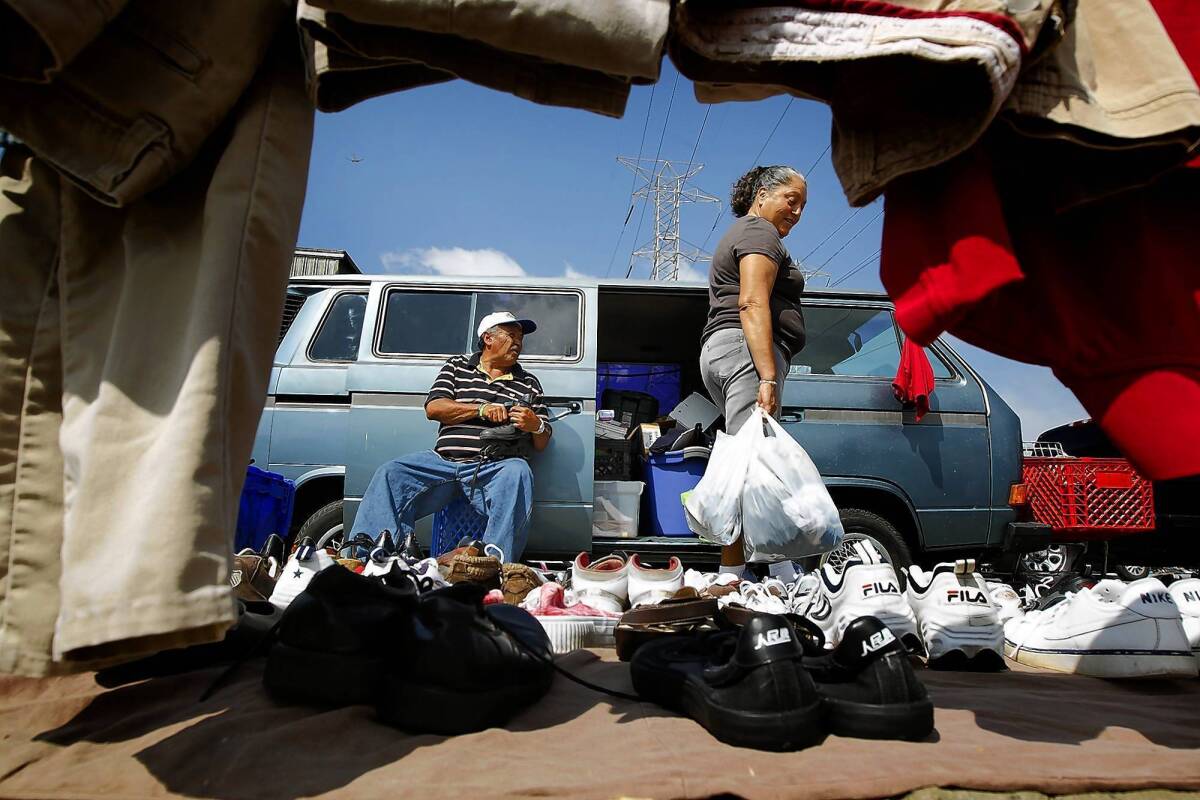L.A. County aims to restrict lawn sales

- Share via
Los Angeles County supervisors agreed Tuesday to explore ways to restrict illegal vending and lawn sales, a move that could give sheriff’s deputies more power to seize goods and issue fines.
Selling used clothes or fruit from front yards or carts on busy streets has been common in Los Angeles for years. But Supervisor Mark Ridley-Thomas and law enforcement officials say the tradition has evolved into a problem, especially in communities around Watts, where informal flea markets have developed on some blocks.
Ridley-Thomas and some residents say the illegal vendors hurt legitimate businesses, dodge sales tax laws and increase traffic in residential neighborhoods.
Sheriff’s Capt. Joseph Gooden, who oversees the station that patrols Watts, told supervisors that his deputies receive as many as 40 calls a day about unlicensed sales, making it one of their most frequent citizen complaints.
Gooden said vendors often leave when they are questioned by deputies only to return a short time later. He said deputies need stricter codes to assess penalties, such as heftier fines and the power to seize goods, that could bring about lasting changes.
“What became abundantly clear to us was that we needed to have more bite, if you will, from the county ordinance,” Gooden said.
Gooden also said he would like to reinstate and expand a task force to combat the problem. Street sales have increased ever since a quality-of-life unit of five deputies was disbanded about a year ago due to budget cutbacks, Gooden said.
Several speakers at Tuesday’s meeting said that the illegal vendors are setting up unsanitary restaurants in the street, leaving behind trash and grease, and that others set their wares up in front of lawful businesses and draw customers away from them.
“It’s out of control,” said Efren Martinez, the executive director of the Florence-Firestone/Walnut Park Chamber of Commerce.
Martinez said business owners are sometimes threatened when they try to speak with people selling goods on the street.
Illegal vendors tell owners to “get back into their business or else they will come back tomorrow to nothing but ashes,” Martinez said.
Antonio Moreno owns a small market on Compton Avenue and said that street vendors often sell the same items he offers in his store.
“At this point, I’m in danger of closing my business because I don’t have [any] sales on the weekends,” he said.
But some community advocates said increased regulation could hurt residents who have few other economic opportunities.
“People are deciding to say: ‘Hey, I need to create my own job. I need to start selling things to pay my bills and take care of my family,’” said Rudy Espinoza, executive director of the Leadership for Urban Renewal Now nonprofit group.
Espinoza also said the vendors “make our streets safer because they’re bringing people on the street... We see that, especially in South L.A., oftentimes street vendors are the only ones out at night. They are putting out lights, putting out chairs, bringing people out. That’s a good thing for us.”
But Ridley-Thomas said the county has an obligation to make sure that public safety and health codes are being met and legal businesses are protected.
“There shouldn’t be any compromising on those standards,” he said.
More to Read
Sign up for Essential California
The most important California stories and recommendations in your inbox every morning.
You may occasionally receive promotional content from the Los Angeles Times.














